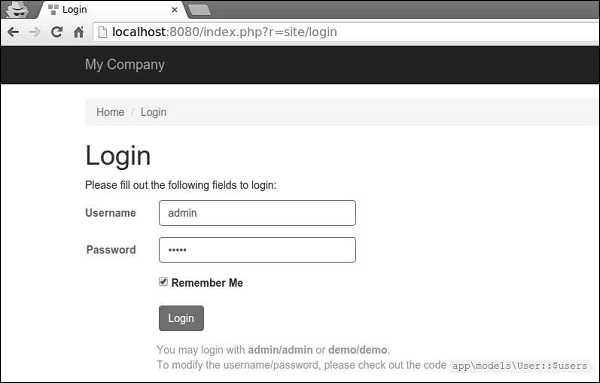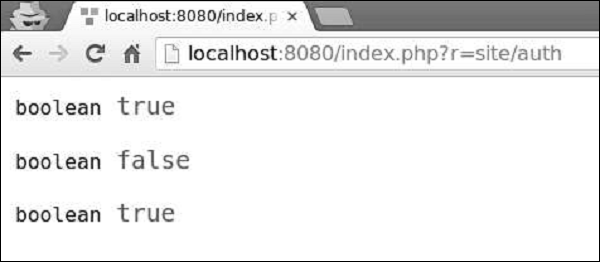Yii-인증
사용자의 신원을 확인하는 프로세스를 호출합니다. authentication. 일반적으로 사용자 이름과 암호를 사용하여 사용자가 자신이 주장하는 사람인지 판단합니다.
Yii 인증 프레임 워크를 사용하려면 다음을 수행해야합니다.
- 사용자 응용 프로그램 구성 요소를 구성합니다.
- yii \ web \ IdentityInterface 인터페이스를 구현합니다.
기본 응용 프로그램 템플릿은 내장 인증 시스템과 함께 제공됩니다. 다음 코드와 같이 사용자 응용 프로그램 구성 요소를 사용합니다.
<?php
$params = require(__DIR__ . '/params.php'); $config = [
'id' => 'basic',
'basePath' => dirname(__DIR__),
'bootstrap' => ['log'],
'components' => [
'request' => [
// !!! insert a secret key in the following (if it is empty) - this
//is required by cookie validation
'cookieValidationKey' => 'ymoaYrebZHa8gURuolioHGlK8fLXCKjO',
],
'cache' => [
'class' => 'yii\caching\FileCache',
],
'user' => [
'identityClass' => 'app\models\User',
'enableAutoLogin' => true,
],
//other components...
'db' => require(__DIR__ . '/db.php'),
],
'modules' => [
'hello' => [
'class' => 'app\modules\hello\Hello',
],
],
'params' => $params, ]; if (YII_ENV_DEV) { // configuration adjustments for 'dev' environment $config['bootstrap'][] = 'debug';
$config['modules']['debug'] = [ 'class' => 'yii\debug\Module', ]; $config['bootstrap'][] = 'gii';
$config['modules']['gii'] = [ 'class' => 'yii\gii\Module', ]; } return $config;
?>위 구성에서 사용자의 ID 클래스는 app \ models \ User로 구성됩니다.
ID 클래스는 yii\web\IdentityInterface 다음 방법으로-
findIdentity() − 지정된 사용자 ID를 사용하여 ID 클래스의 인스턴스를 찾습니다.
findIdentityByAccessToken() − 지정된 액세스 토큰을 사용하여 ID 클래스의 인스턴스를 찾습니다.
getId() − 사용자의 ID를 반환합니다.
getAuthKey() − 쿠키 기반 로그인을 확인하는 데 사용되는 키를 반환합니다.
validateAuthKey() − 쿠키 기반 로그인 키 검증 로직을 구현합니다.
기본 애플리케이션 템플릿의 사용자 모델은 위의 모든 기능을 구현합니다. 사용자 데이터는$users 재산 −
<?php
namespace app\models;
class User extends \yii\base\Object implements \yii\web\IdentityInterface {
public $id;
public $username; public $password;
public $authKey; public $accessToken;
private static $users = [ '100' => [ 'id' => '100', 'username' => 'admin', 'password' => 'admin', 'authKey' => 'test100key', 'accessToken' => '100-token', ], '101' => [ 'id' => '101', 'username' => 'demo', 'password' => 'demo', 'authKey' => 'test101key', 'accessToken' => '101-token', ], ]; /** * @inheritdoc */ public static function findIdentity($id) {
return isset(self::$users[$id]) ? new static(self::$users[$id]) : null;
}
/**
* @inheritdoc
*/
public static function findIdentityByAccessToken($token, $type = null) {
foreach (self::$users as $user) {
if ($user['accessToken'] === $token) {
return new static($user); } } return null; } /** * Finds user by username * * @param string $username
* @return static|null
*/
public static function findByUsername($username) { foreach (self::$users as $user) { if (strcasecmp($user['username'], $username) === 0) { return new static($user);
}
}
return null;
}
/**
* @inheritdoc
*/
public function getId() {
return $this->id; } /** * @inheritdoc */ public function getAuthKey() { return $this->authKey;
}
/**
* @inheritdoc
*/
public function validateAuthKey($authKey) { return $this->authKey === $authKey; } /** * Validates password * * @param string $password password to validate
* @return boolean if password provided is valid for current user
*/
public function validatePassword($password) { return $this->password === $password;
}
}
?>Step 1 − URL로 이동 http://localhost:8080/index.php?r=site/login 로그인 및 암호를 위해 admin을 사용하여 웹 사이트에 로그인하십시오.

Step 2 − 그런 다음 actionAuth() SiteController에.
public function actionAuth(){
// the current user identity. Null if the user is not authenticated.
$identity = Yii::$app->user->identity; var_dump($identity);
// the ID of the current user. Null if the user not authenticated.
$id = Yii::$app->user->id;
var_dump($id); // whether the current user is a guest (not authenticated) $isGuest = Yii::$app->user->isGuest; var_dump($isGuest);
}Step 3 − 주소 입력 http://localhost:8080/index.php?r=site/auth 웹 브라우저에서에 대한 자세한 정보를 볼 수 있습니다. admin 사용자.

Step 4 − 로그인 및 로그인하려면 다음 코드를 사용할 수 있습니다.
public function actionAuth() {
// whether the current user is a guest (not authenticated)
var_dump(Yii::$app->user->isGuest); // find a user identity with the specified username. // note that you may want to check the password if needed $identity = User::findByUsername("admin");
// logs in the user
Yii::$app->user->login($identity);
// whether the current user is a guest (not authenticated)
var_dump(Yii::$app->user->isGuest); Yii::$app->user->logout();
// whether the current user is a guest (not authenticated)
var_dump(Yii::$app->user->isGuest);
}먼저 사용자가 로그인했는지 확인합니다. 값이 반환되면 false, 다음을 통해 사용자에 로그인합니다. Yii::$app → user → login() 전화를 걸어 로그 아웃합니다. Yii::$app → user → logout() 방법.
Step 5 − URL로 이동 http://localhost:8080/index.php?r=site/auth, 다음이 표시됩니다.

그만큼 yii\web\User 클래스는 다음 이벤트를 발생시킵니다-
EVENT_BEFORE_LOGIN− yii \ web \ User :: login () 시작 부분에 발생
EVENT_AFTER_LOGIN − 로그인 성공 후 발생
EVENT_BEFORE_LOGOUT− yii \ web \ User :: logout () 시작 부분에 발생
EVENT_AFTER_LOGOUT − 성공적인 로그 아웃 후 발생